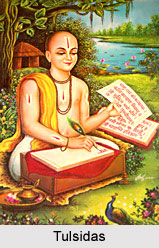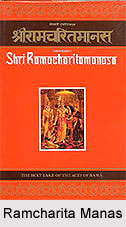 Tulsidas is regarded to be one of the most celebrated representatives of the Bhakti school of Hinduism. He (1574-1577) composed `Ramcharitmanas`, which is an authority on Hindu religion and till date an essential treatise in Hindu rituals. One of the best poets ever to have graced Bharat, his verses were written in Hindi language and accessible to everyone. Tulsidas was a great poet, philosopher, saint and, more importantly, the devotee of Lord Rama.
Tulsidas is regarded to be one of the most celebrated representatives of the Bhakti school of Hinduism. He (1574-1577) composed `Ramcharitmanas`, which is an authority on Hindu religion and till date an essential treatise in Hindu rituals. One of the best poets ever to have graced Bharat, his verses were written in Hindi language and accessible to everyone. Tulsidas was a great poet, philosopher, saint and, more importantly, the devotee of Lord Rama.
Early Life Of Tulsidas
There shrouds a smoke of controversy dealing with his year of birth. Some say that the year is 1532 while others opine it is 1588. But there is no disagreement regarding his birth place. It is Rajpura at present which is known as Uttar Pradesh. At the time of birth he was named Rambola as it is believed that he uttered the name of Lord Rama at the time of birth. He suffered the pangs of separation from his parents at a very young age and was even abandoned by his relatives. He came into contact with some saints who advised him to surrender to Lord Rama. As time grew on, Tulsi`s love for Rama grew deeper and deeper.
Literary Works of Tulsidas
Tulsidas began his literary works in 1574. He penned down some works of great literary merit, but his greatest work is Ramcharitmanas which occupies a couple of beautiful numbers called `chaupai` completely devoted to Lord Rama. Many verses of Ramcharitmanas are very popular proverbs and have passed into common speech, and are used by millions of Hindi speaker.
 Besides Ramcharitmanas, Tulsidas wrote five longer and six shorter works, most of which deal with the theme of Rama, his doings, and devotion to him. Other great literary masterpieces composed by Tulsidas include the Dohavali, the Kavitavali, the Gitavali, the Krishnavali, the Vinay Patrika, and the much revered poem praising the Lord Hanuman, the Hanuman Chalisa. In fact the dohas of Tulsidas are popular even today and are even part of the curriculum in various parts of India.
Besides Ramcharitmanas, Tulsidas wrote five longer and six shorter works, most of which deal with the theme of Rama, his doings, and devotion to him. Other great literary masterpieces composed by Tulsidas include the Dohavali, the Kavitavali, the Gitavali, the Krishnavali, the Vinay Patrika, and the much revered poem praising the Lord Hanuman, the Hanuman Chalisa. In fact the dohas of Tulsidas are popular even today and are even part of the curriculum in various parts of India.
His minor compositions comprise Vairagya Sandipani, Baravai Ramayana, Janaki Mangal, Ramalala Nahachhu, Parvati Mangal, and Sankata Mochana. His entire collection of compositions, consisting of 13 books, has been translated into English (as poems) by Binda Prasad Khattri (1898-1985).
Tulsi was a personification of humanity. Tulsidas also appreciated the diverse tenets of Shaiva, advaita and Samkhya Philosophy. He authored 22 different works. In Kashi, he became the head of the monastery in lolarka kunda and was designated "Gosain."
Personal Life of Tulsidas
Tulsidas married Ratnavali on the thirteenth day of the bright half of the Jyeshta (May-June) in Vikram 1583. The couple was blessed with a son named Tarak who died as a toddler. Later Ratnavali`s reproach for his love and advice to love Lord Rama instead of her guides him to lead the life of an ascetic. He lived in Chitrakuta hill for some time before 1564. He used to go around houses for alms. Over the next few years, Tulsidas wandered across India, visiting many pilgrimage sites in his quest for Lord Rama.
Around 1612, he started to suffer from acute arm pain, boils causing uprooting of his hair and also seemed to have suffered from the epidemic in the local area. Having dedicated his life to Lord Rama, these were considered as mere trifles and Tulsidas passed away on the third day of the dark fortnight in the month of Shravana in 1623. All of Tulsidas`s Ramcharitamanas is inscribed on the marble walls of Tulasi Manasa Mandir in Kashi. His sandals and couple of his minor possessions are preserved in this temple.
His writings execute an amalgamation of his intense devotion and philosophical ideologies, making him one of the greatest Hindi poets to ever compose such outstanding pieces of verse.













